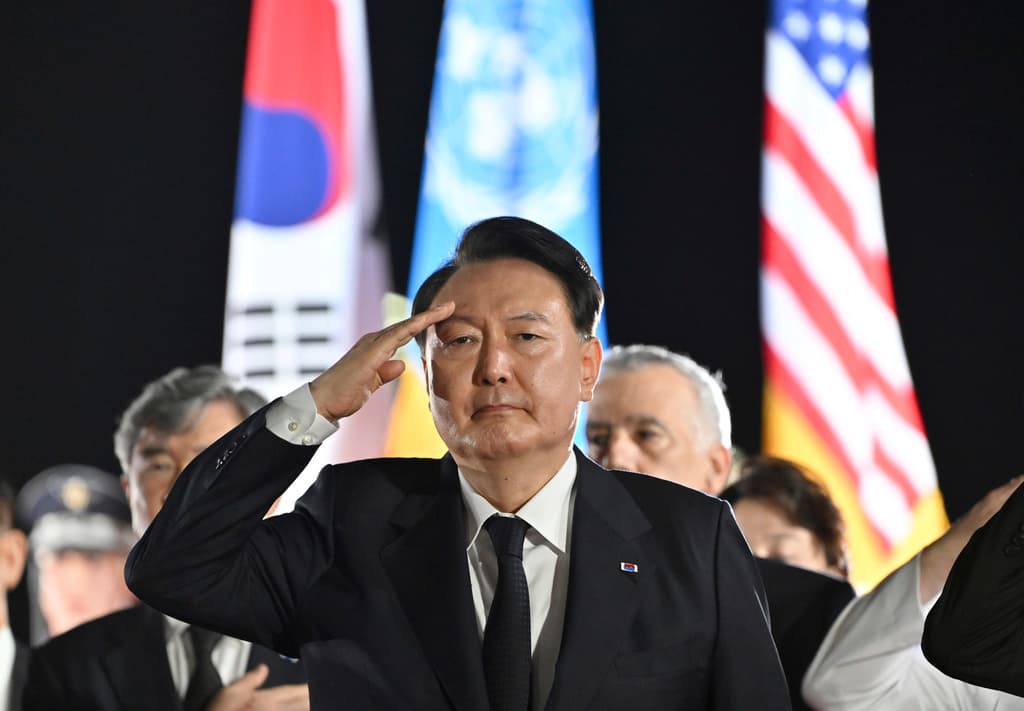Electoral Disaster in South Korea’s Assembly Election Could Imperil a Growing Entente With Japan and America
Joint military exercises could be curtailed as left-leaning Minjoo party flexes its muscles after gains in the legislature, and an impeachment of President Yoon is not out of the question.

The electoral disaster suffered by President Yoon’s “ruling” conservative party in South Korea’s national assembly elections Wednesday will raise questions about the future of what had seemed like much-improved ties with both Washington and Tokyo.
“It’s really bad,” an office worker, Kim Yong-jin, said as the returns poured in showing Mr. Yoon’s People Power Party holding barely a third of the assembly’s 300 seats. “I’m very much concerned about the future of the relationship between Korea and America.”
It’s widely believed that the success of the left-leaning Minjoo, or Democratic, party threatens to undo the carefully wrought gains in relations that had deteriorated badly under the liberal government of the previous president, Moon Jae-in.
South Korea’s conservative president appeared as one of America’s closest friends when President Biden hosted him for a trilateral meeting last August with Prime Minister Kishida. The president persuaded Mr. Yoon to endorse joint American-Korean military exercises that Mr. Moon had banned, and he seemed to have reversed his country’s terrible relations with Japan, the legacy of Japanese colonial rule.
“The Minjoo party is very close to China,” a university student, Lim Hyun, said. “That will have a bad impact on current relations with the U.S. and Japan.” The ultimate fear is that relations between Seoul and Washington could deteriorate sharply while the Minjoo party moves closer to China, in a renewed bid for talks with North Korea, and again suspends war games with the Yanks.
With three years to go in his single five-year term, Mr. Yoon is well aware that the majority Minjoo party, allied with the minority Rebuild Korea Party, will block almost all his domestic programs in the assembly. As president, he can still authorize joint military exercises, but may be forced to scale them down in hopes of working out legislative compromises.
Mr. Yoon, though, may not be in a position to do even that. As the votes were being counted, members of all three parties, meeting in separate halls in the office buildings of the assembly, began to speculate on the possibility of impeaching Mr. Yoon. All that’s needed, they noted, would be the votes of two-thirds of assembly members, as stipulated by the Korean constitution.
At the least, it seemed certain that foes of the government would be organizing massive demonstrations against the president just as they did against a previous president, Park Geun-hye, who was impeached and then jailed before the election in 2017 of Moon Jae-in, who served a full five-year term.
The Minjoo has less than the requisite 200 seats but might ally with the Rebuild Korea Party, led by a charismatic political figure, Cho Kuk, who served for a month as justice minister during the Moon administration before resigning in a corruption scandal. Together they might muster 200 seats in a deal in which charges against Mr. Cho were dropped.
“We’re very disappointed,” a People Power Party official, Oh Yong-hee, said.
“Anything could happen.”
The head of the Minjoo, Lee Jae-myung, who lost to Mr. Yoon in the 2022 presidential election by a margin of less than 1 percent, also is mired in seemingly endless corruption scandals. He’s still hoping, though, to run for president again when Mr. Yoon is either forced out of office or completes his term.
Although foreign policy and the dangers posed by North Korea were not major factors in the assembly campaign, they’re expected to gain traction as Mr. Lee criticizes Mr. Yoon’s job performance. Messrs. Lee and Cho, while not opposed to the Korean-American alliance, have both accused Mr. Yoon of provoking North Korea unnecessarily in war games in which one of the goals has been to “decapitate” the North Korean leader.

